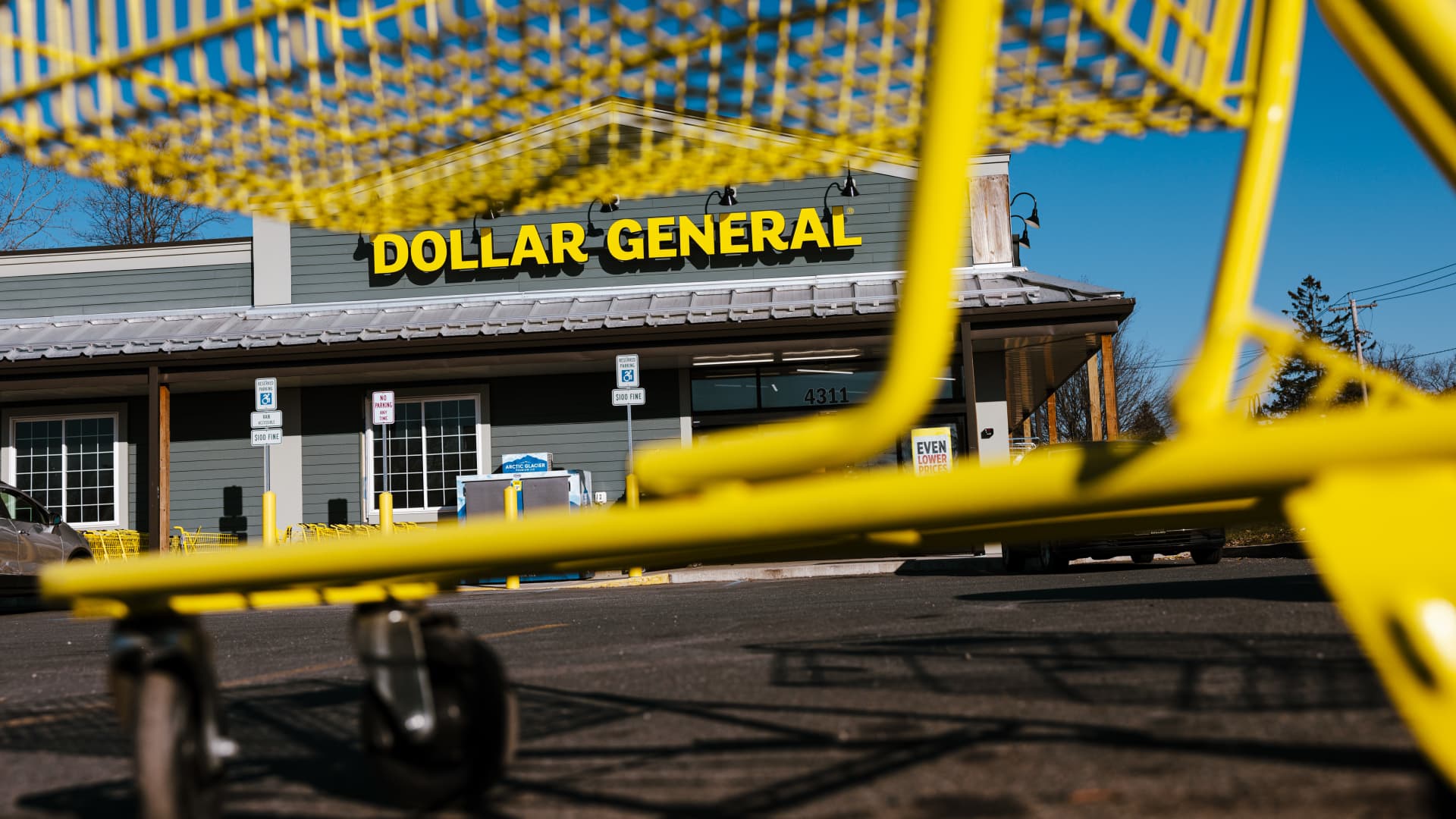A Dollar General store in Germantown, New York, on Nov. 30, 2023.
Angus Mordant/Bloomberg via Getty Images
Three of the nation’s largest retailers — Dollar General, Dollar Tree and Kroger — charge fees to customers who ask for “cash back” at check-out, amounting to more than $90 million a year, according to the Consumer Financial Protection Bureau.
Many retailers offer a cash-back option to consumers who pay for purchases with a debit or pre-paid card.
But levying a fee for the service may be “exploiting” certain customers, especially those who live in so-called banking deserts without easy access to a bank branch or free cash withdrawals, according to a CFPB analysis issued Tuesday.
That dynamic tends to disproportionately impact rural communities, lower earners and people of color, CFPB said.
Not all retailers charge cash-back fees, which can range from $0.50 to upwards of $3 per transaction, according to the agency, which has cracked down on financial institutions in recent years for charging so-called “junk fees.”
More from Personal Finance:
The IRS method of ‘last resort’ to collect overdue taxes
How investors can prepare for lower interest rates
Why remote work has staying power
Five of the eight companies that the CFPB sampled offer cash back for free.
They include Albertsons, a grocer; the drugstore chains CVS and Walgreens; and discount retailers Target and Walmart. (Kroger proposed a $25 billion merger with Albertsons in 2022, but that deal is pending in court.)
“Fees to get cash back are just one more nickel and dime that all starts to add up,” said Adam Rust, director of financial services at the Consumer Federation of America, an advocacy group.
“It just makes it harder and harder to get by,” he said. “It’s thousands of little cuts at a time.”
Luis Alvarez | Digitalvision | Getty Images
A spokesperson for Dollar General said cash back can help save customers money relative to “alternative, non-retail options” like check cashing or ATM fees.
“While not a financial institution, Dollar General provides cashback options at our more than 20,000 stores across the country as a service to customers who may not have convenient access to their primary financial institution,” the spokesperson said.
Spokespeople for Kroger and Dollar Tree (which operates Family Dollar and Dollar Tree stores) didn’t respond to requests for comment from CNBC.
Kroger, Dollar General and Dollar Tree were respectively the No. 4, 17 and 19 largest U.S. retailers by sales in 2023, according to the National Retail Federation, a trade group.
Cash back is popular
The practice of charging for cash back is relatively new, Rust explained.
For example, in 2019, Kroger Co. rolled out a $0.50 fee on cash back of $100 or less and $3.50 for amounts between $100 and $300, according to CFPB.
This applied across brands like Kroger, Fred Meyers, Ralph’s, QFC and Pick ‘N Save, among others.
However, Kroger Co. began charging for cash back at its Harris Teeter brand in January 2024: $0.75 for amounts of $100 or less and $3 for larger amounts up to $200, CFPB said.
Cash withdrawals from retail locations is the second most popular way to access cash, representing 17% of transactions over 2017-22, according to a CFPB analysis of the Diary and Survey of Consumer Payment Choice.
ATMs were the most popular, at 61%.
But there are some key differences between retail and ATM withdrawals, according to CFPB and consumer advocates.
For instance, relatively low caps on cash-back amounts make it challenging to limit the impact of fees by spreading them over larger withdrawals, they said.
The average retail cash withdrawal was $34 from 2017-22, while it was $126 at ATMs, CFPB said.
Banking deserts are growing
However, retailers may be the only reasonable way to get cash for consumers who live in banking deserts, experts say.
More than 12 million people — about 3.8% of the U.S. population — lived in a banking desert in 2023, according to the Federal Reserve Bank of Philadelphia.
That figure is up from 11.5 million, or 3.5% of the population, in 2019, it found.
Generally speaking, a banking desert constitutes any geographic area without a local bank branch. Such people don’t live within 10 miles of a physical bank branch. The rise of digital banking, accelerated by the Covid-19 pandemic, has led many banks to close their brick-and-mortar store fronts, according to Lali Shaffer, a payments risk expert at the Federal Reserve Bank of Atlanta.
These deserts “may hurt vulnerable populations” who are already less likely to have access to online and mobile banking, she wrote recently.
Retailers blame banks
Retail advocates say banks are to blame for cash-back fees.
Merchants must pay fees to banks whenever customers swipe a debit card or credit card for purchases. Those fees might be 2% to 4% of a transaction, for example.
Since cash-back totals are included in the total transaction price, merchants also pay fees to banks on any cash that consumers request.
The “vast majority” of retailers don’t charge for cash back, and therefore take a financial loss to offer this service to customers for free, said Doug Kantor, general counsel at the National Association of Convenience Stores and a member of the Merchants Payments Coalition Executive Committee.
“Banks have abandoned many of these communities and they’re gouging retailers just for taking people’s cards or giving people cash,” he said.
But consumer advocates say this calculus overlooks the benefit that retailers get by offering cash back,
“You’d think they’d see this as a free way to get customers: coming into [the] store because the bank branch isn’t there,” Rust said. “Instead they’re going ahead and charging another junk fee.”

 Blog Post7 days ago
Blog Post7 days ago
 Economics1 week ago
Economics1 week ago
 Finance1 week ago
Finance1 week ago
 Economics1 week ago
Economics1 week ago
 Economics1 week ago
Economics1 week ago
 Personal Finance1 week ago
Personal Finance1 week ago
 Economics1 week ago
Economics1 week ago
 Accounting1 week ago
Accounting1 week ago










